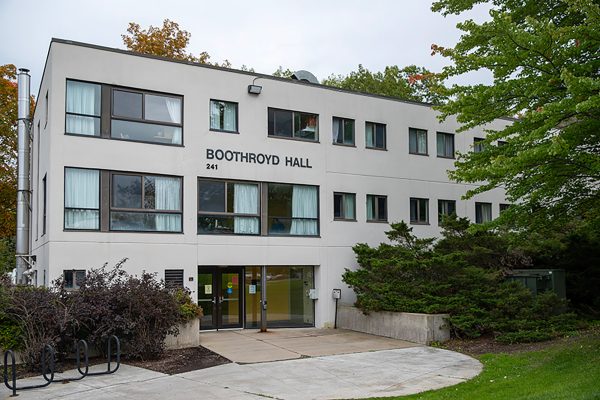As the cost of housing continues to increase in Ithaca, many Ithaca College faculty members are navigating the real estate market on lower wages than necessary to sustainably live in Ithaca. Through IC extended housing, extra classes, long commutes and working multiple jobs, some professors are trying to find ways to support themselves and their families.
Ithaca is in the top 21% of the most expensive cities in the world to live in, according to LivingCost.org. Brent Katzmann, Ithaca office manager for Warren Real Estate, said that over the last five years, the average sale price for single-family homes, condos and townhomes in Tompkins County has grown by over 35%.
“It’s given people a lot of instant equity, which for homeowners is a good thing, but it’s also caused real issues with affordability because wages have not kept up at that pace,” Katzmann said.
Brendan Murday, associate provost for faculty affairs, said he works to identify salaries that make sense for each newly hired faculty member, but the cost of living in Ithaca is not a direct factor in determining salaries.
“We look at the salaries for the faculty in the department and try to make sure that there’s some equity with where that new hire would start and where current faculty are,” Murday said. “We will also take a look at some data nationwide for that discipline.”
Marcy Sutherland — an instructor in the Department of Education at IC and research and communications coordinator for the Park Center for Independent Media — said she has needed to have multiple jobs to live in Ithaca when she was only working at PCIM, including substitute teaching and working at a center for adults with autism. Sutherland said she is limited in the number of hours she is allowed to work at the college.
“I just don’t think they should be controlling how much money I make,” Sutherland said. “I
get that they have control over my salary, they have control over the amount I make working with PCIM, but how much I work? I find it really insulting. I think it’s infuriating to put a cap on my overall wealth. … They have no idea what I’m responsible for financially.”
In her position with PCIM, she is limited to only 13 hours a week, even though she could work up to 30 hours a week within the nature of it being a part-time position.
“I have been a really good instructor regardless of how many jobs I have,” Sutherland said. “No one asked about how working in both places could be beneficial. … There’s now more engagement between education and PCIM and media literacy. And the conversations I had were still only about hours a month, and that was disheartening.”
According to Indeed, the average annual salary for an instructor at IC is $61,299, which is lower than the recommended $73,392 per year needed to rent comfortably in Ithaca. Sutherland said she makes around $60,000 as an instructor. She said she lives in Brooktondale, about 15 minutes from the IC campus, since she cannot afford to live in Ithaca.
For homeowners, Katzmann said the issue of affordability is with the amount of capital or cash that is required on top of the monthly payment.
“If you want to put 10% down on a $450,000 home, that’s $45,000,” Katzmann said.
“And you’ve got closing costs on top of that, mortgage applications, appraisal fees, prepayments for taxes and insurance, so you could be out $60,000 just to get in the door.”
Even though college faculty members are impacted by the housing costs, the college town environment, combined with Cornell University, is part of what makes the real estate market competitive. Mickey Huff, professor in the Department of Journalism and distinguished director of the Park Center for Independent Media, said the colleges in Ithaca are the reason for its bustling, desirable culture.
“Go and find me another 30,000 population town anywhere within 50 miles of here,” Huff said. “Does it have what we have here? Nothing like it. … Those things are here because the colleges are here, and the colleges raise the standard of living, until the colleges decide that they don’t have to pay people to work there anymore, and then the very people that make a place what it is have to leave.”
Faculty at Cornell are paid more than faculty at IC in comparable roles. According to a Fall 2023 Faculty Salary Survey, instructors are paid over $94,000 a year compared to the $61,299 salary of IC instructors. While those salaries reflect the financial states and funding of both institutions, faculty are still navigating the same housing market.
Cornell’s presence in Ithaca also impacts property taxes. Approximately 57% of the property in the City of Ithaca is tax-exempt property, mostly owned by Cornell. This impacts property owners in Ithaca because the median property tax rate is 2.86%, which is higher than the national median property tax rate of 1.02%.
Some faculty members have opted to commute to avoid the high costs of housing in Ithaca. Katzmann said he sees the prices drop the farther away from Ithaca in Chemung County and Seneca County.
“People who have a given housing budget because of their income have been looking further and further afield,” Katzmann said. “They’ve been accepting the idea that they may not be able to live right close to work.”

Extended housing
On campus, IC has extended housing that is available to faculty and staff. The extended housing program allows employees to live in a residence hall for $600 a month, which is lower than the average cost of $1,671 for a 428 square foot studio apartment. Terrace 12, Terrace 13 and Boothroyd Hall are the main locations where extended housing is provided.
Jeff Golden, associate vice president of auxiliary services at IC, oversees extended housing. The college began offering extended housing in 2022. Golden said IC wants to provide an inexpensive housing option open to everyone, regardless of income.
“The Ithaca housing market is extremely expensive,” Golden said. “There’s a high demand and a relatively low supply. And so long-term housing’s a struggle for faculty and staff up and down the pay scale.”
Golden said there are about 10-20 faculty and staff members utilizing extended housing per building. He said the number is constantly fluctuating because there are visitors who use the space or employees using it temporarily.
However, the extended housing is not accessible to faculty and staff looking for housing for their family. Golden said extended housing is not the single solution to the problem, but IC plans to continue to offer it for those it does help. He said if student enrollment increases, the spaces to live will be given to students first.
“I recognize that the pressures of the Ithaca area housing market are greater than this thing will have an opportunity to solve,” Golden said. “We are very aware of the fact that, at its best, it is simply us trying to offer a solution that hopefully will work for some people, but absolutely will surely not work for everyone.”















